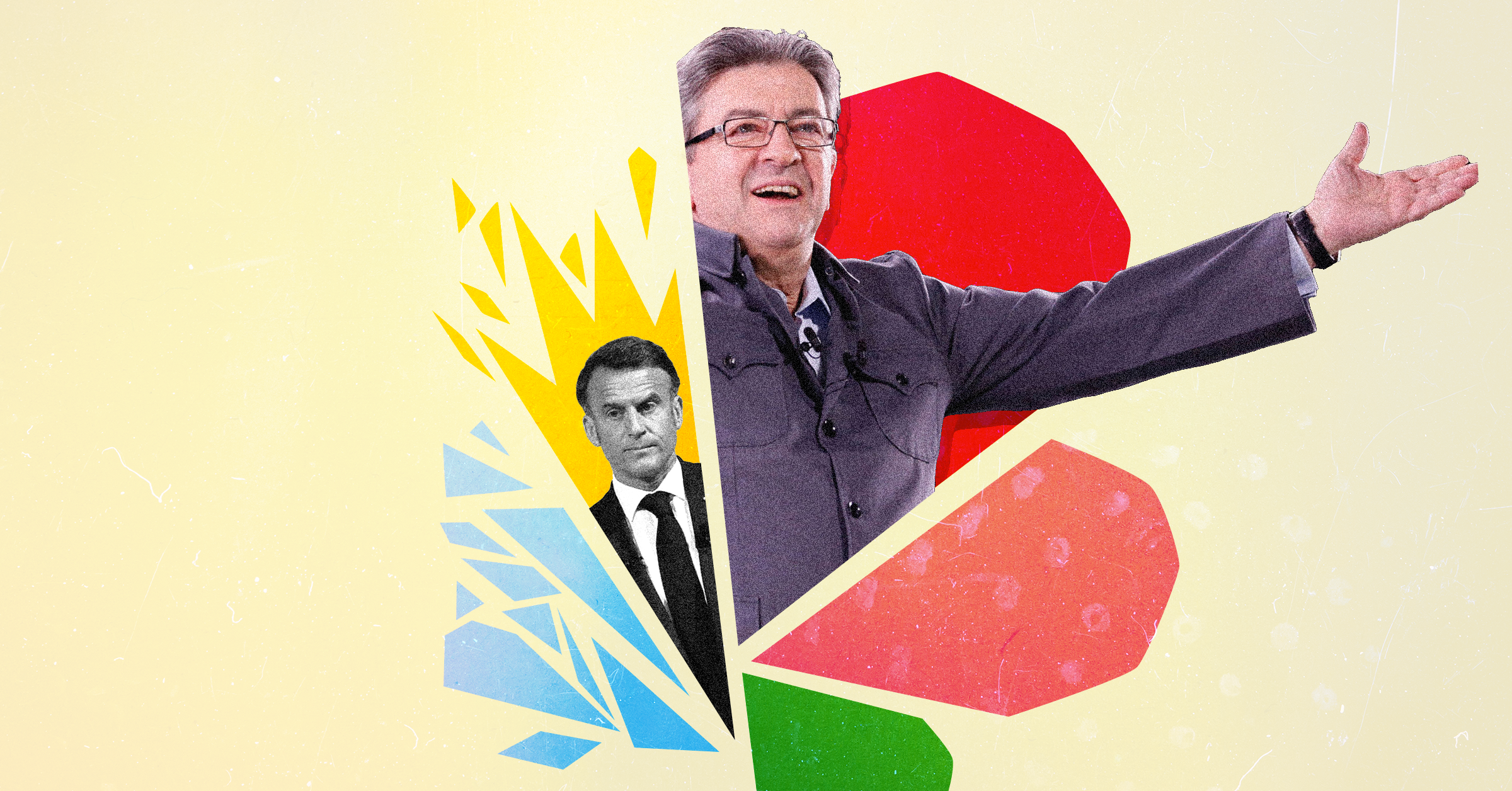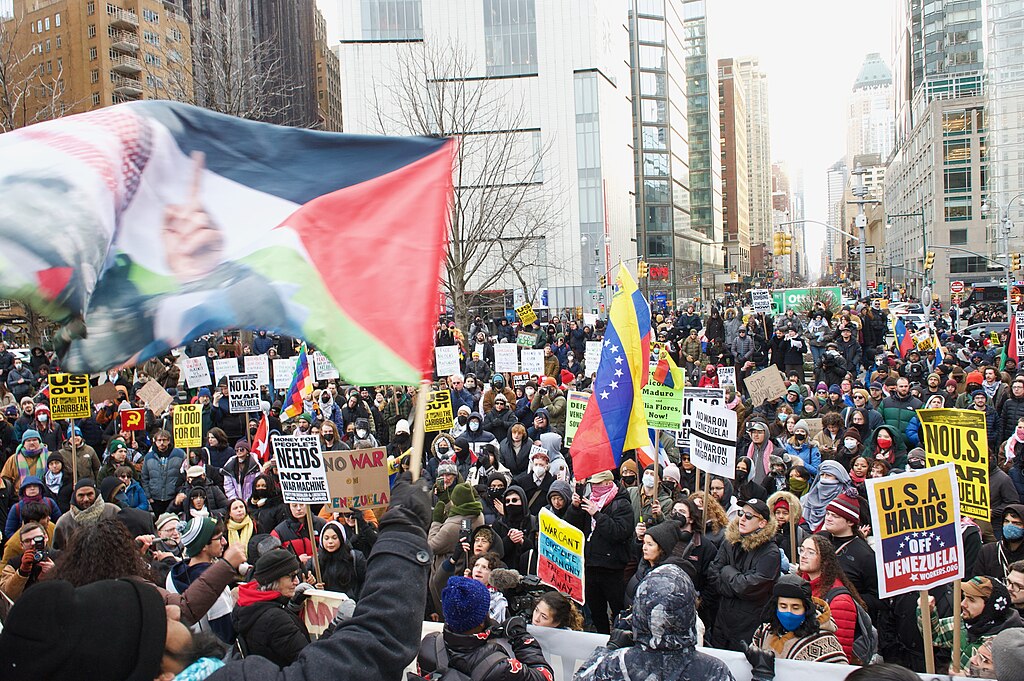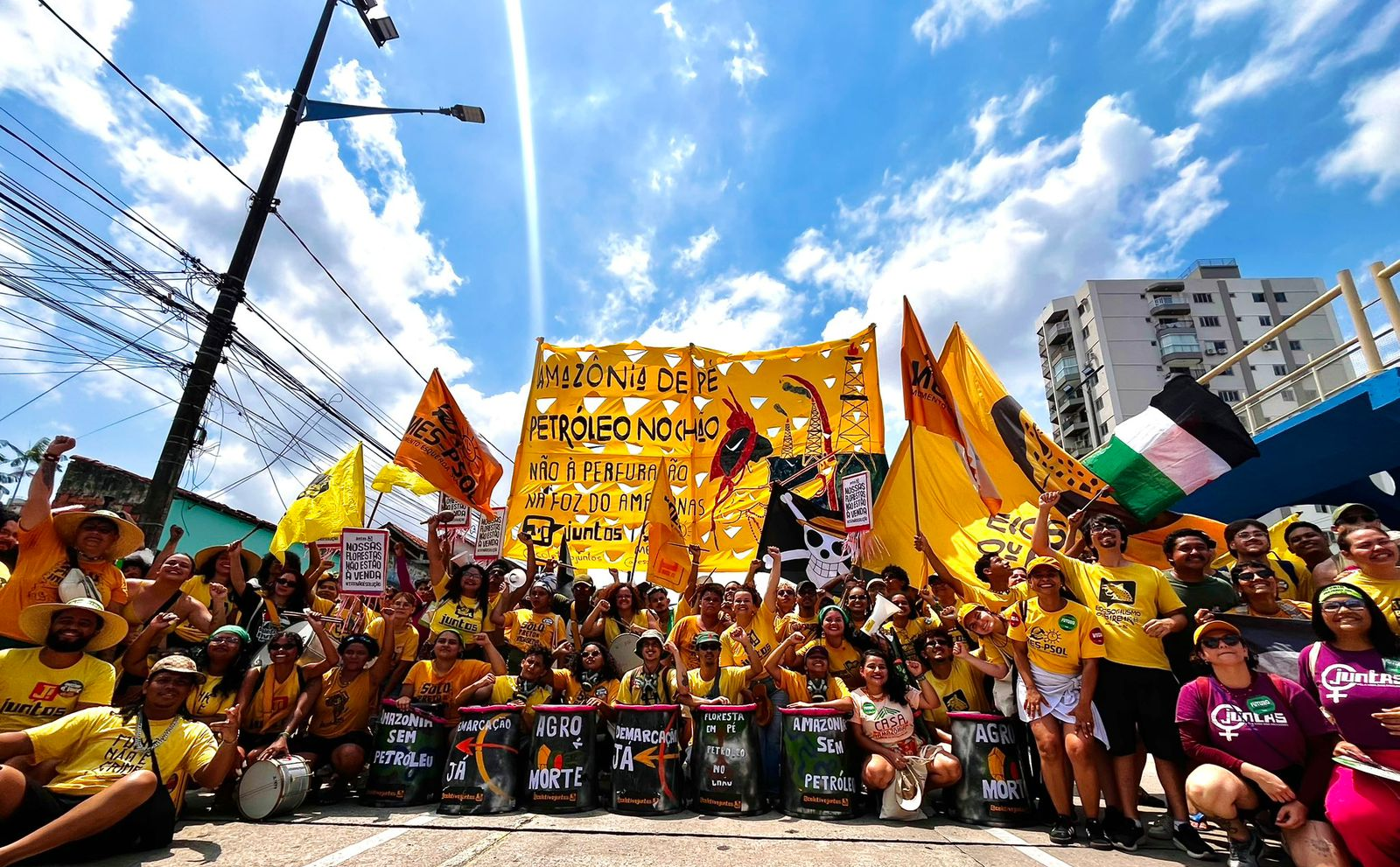A coalition of center-left to far-left forces called the Nouveau Front Populaire (NFP, New Popular Front) won a plurality in the French National Assembly earlier this month, beating both French President Emmanuel Macron’s center-right Ensemble (Together) coalition and Jordan Bardella and Marine Le Pen’s far-right Rassemblement National (RN, National Rally). A few years ago, one of the NFP coalition parties, La France Insoumise (LFI, France Unbowed), was just a presidential ballot line for the scrappy former Trotskyist Jean-Luc Mélenchon. Now LFI is the leading member of the “new popular front.”
We have yet to see how the coalition will govern, but LFI’s progress has a lot to teach DSA about growing the left and building political independence from the center-right, which in our case means the Democratic Party.
Mélenchon is no stranger to contentious battles with the rest of the left. He left the Parti Socialiste after it took a rightward turn in 2008 to found Parti de Gauche (PG) in early 2009, then left PG to found LFI in 2016. From battling the center-left on Palestine to the center-right on pension reform, the party Mélenchon founded is the most combative — and most effective — component of the NFP, precisely because it sticks to its principles, preserves its political independence, and refuses to compromise on its values to achieve power.
Winding Path of Political Independence
Mélenchon was able to coalesce not one but two parties around himself not only because he is individually compelling but because he has consistently articulated a left alternative to both the center-right and the center-left.
Similar to Bernie’s 2016 campaign, Mélenchon’s presidential runs in 2012, 2017, and 2022 laid out a platform based on economic populism and social progressivism. Though he never won, the campaigns raised his public profile and elevated a critical alternative to center-right austerity and far-right mania. In France’s two-round voting system, the past three presidential races have led to run-offs between center-right and far-right candidates. Each time, Mélenchon stated his opposition to the far-right in the second round, tacitly recommending the center. This was not quid pro quo opportunism facilitating the left’s assimilation into a center-right governing coalition; rather, it was a calculated retreat based on a clear-headed understanding of the alternatives.
Mélenchon’s presidential campaigns built an independent electoral machine, concentrating his growing political base into a new party — LFI — that maintained an oppositional strategy and progressive platform.
Even while in the minority in the National Assembly, LFI has stuck to its principles by practicing strict electoral discipline over its deputies, who are required to vote with the majority of the party. This discipline is as much self-imposed as it is party-led. LFI deputies genuinely believe in the strategic and political vision of LFI, including its electoral discipline, and vote accordingly; those who do not leave or have even been expelled.
This unified front not only presents a coherent political vision to voters but also affords LFI the political strength required to lead unwieldy center-left to far-left coalitions. As Mélenchon says in an article appropriately titled “Confrontation,” LFI believes in “unity without union.” In other words, they will, whenever possible, work in coalition with the center-left, but refuse to compromise with them if they start to vote and speak too much like the center-right.
A Popular Front?
What is the Nouveau Front Populaire, then? A callback to the historic “Front Populaire” of socialist and communist parties formed in 1936 in response to the far-right, today’s NFP aims for similar progressive economic changes, but it does not encompass all democratic forces against the fascist threat, nor is it controlled by the coalition’s right flank. Encompassing the progressive to far left, NFP’s driving force is LFI, representing a political platform far more aligned with DSA than with the U.S. Democratic Party.
France has a two-round voting system for its National Assembly, or lower house, which is somewhat complex at first glance. If one candidate achieves more than 50 percent of the votes in the first round, they win by default and the district does not hold another round. Otherwise, all candidates who garnered at least 12.5 percent of the vote proceed to the second, after which the candidate with the plurality wins. This system is prone to spoiling, which is why coalitions like NFP are valuable.
After the first round of voting on June 30 this year, many seats in the National Assembly were looking at three-way run-offs between the left, center-right, and far-right. Consequently, NFP unilaterally chose to drop its candidates when in third place against the far- and center-right, to avoid spoiling those races in the far-right’s favor. To quote Mélenchon, “We decided this without negotiation or quid pro quo. We withdrew the ladder that the RN [the far-right party] needed to win. Nothing more. But nothing less.”
Though some might have interpreted this decision as a form of “popular frontism” analogous to DSA situationally supporting the Democratic Party against the right, this analysis misunderstands both NFP’s and the center-right’s motivations. While some deputies of the center-right Ensemble coalition (and even some of the right-wing Les Républicains!) individually followed the left’s lead, Ensemble did not direct its candidates to strategically withdraw in the left’s favor as the left had for them. Some Ensemble powerbrokers, like Prime Minister Gabriel Attal, encouraged Ensemble candidates in third place to drop out and endorse the left against the far-right, while Emmanuel Macron made private calls encouraging his center-right contenders to spoil their races in the far-right’s favor.
NFP includes coalition members less combative and progressive than LFI. Having spent almost a decade articulating an uncompromising left platform, however, LFI has become majoritarian, if not hegemonic, on the French left. With its passionate base and committed network of electeds, LFI has made the remaining left parties at least partially reliant on it for political relevance. NFP demonstrated this conclusively when both the left-wing Nouvelle Parti Anticapitaliste (NPA) and the Socialist Party, to the right of LFI, returned to the fold. Both parties within the past two years had respectively denounced and almost split from the electoral coalition that preceded NFP, NUPES.
Unlike populist movements in Spain, the U.K., and the U.S., which have been destroyed by or subjugated to their centrist “allies,” Mélenchon’s long path to power has created a party with enough gravitational pull to keep both its left and right flanks in line.
Limitations of the Model
The political base that powered the rise of LFI is composed of well-organized union and student activists, as well as many of France’s immigrant communities. But like DSA, it is mostly confined to young, well-educated city-dwellers and has struggled to move into rural areas dominated by the right. LFI lacks the institutional structure to support long-term community or labor organizing, a problem tied to the absence of a lasting system of internal debate and democracy.
LFI’s dependence on the well-educated is somewhat ameliorated by France’s militant, politically independent unions, which cohere a larger and more politically aware working class base than what exists in the U.S. — it’s hard to miss the videos of nurses with catapults or firefighters clashing with police. Just last year, the massive strikes against Macron’s pension “reform” sent millions into the streets, as even the country’s more conservative unions were moved to action by their militant rank-and-file members, furious with raising the retirement age from 62 to 64. But this militancy must not be mistaken for a majoritarian political base — like the U.S., only 10 percent of France’s labor force is unionized. Clearly, LFI will need to move beyond its current base if it wishes to cobble together more than a plurality coalition in the National Assembly. For that, deeper political organizing is needed.
LFI activates its base with impressive local apparatuses (“action groups”) that operate the electoral campaign at a neighborhood and occasionally even street level. However, this kind of electoral mobilization tends toward a structure that is broad but not deep, community-based but not quite democratic, and it therefore cannot penetrate new communities of traditionally hard to reach urban and rural working poor, especially those beyond LFI’s bastions in France’s largest cities.
The “gaseous“ structure at the heart of the party incorporates the labor but not necessarily the voices of activist members. Action groups have no direct ties to national leadership in the way that DSA chapters send delegates to convention; party membership is not based on dues nor is there a way for activists to directly participate in party decision-making. This deliberately ambiguous, top-down hierarchy can operate effectively in the National Assembly, but it does not hold enough space for internal debate between tops and rank-and-filers, and therefore likely cannot build long-term, grassroots organizing projects.
Unfortunately, democracy has not been championed as a necessary pillar of party-building on its own, but rather used as a vehicle to push moderation of the party’s platform by members who have since left or been kicked out. Without the structure for internal debate, deputies resort to broadcasting their dissident opinions about everything from Gaza to political strategy in interviews with the press. Like its American counterpart, French media is mostly operated by and for the rich and the center-right government, and has been relentlessly hostile to Mélenchon and LFI from its founding. The press is more than happy to feature dissident LFI members airing personal and strategic disagreements, if only to present an image of an unstable and dangerous far-left.
Analogies for DSA
Where does that leave us? LFI does not face the difficult Catch-22 of socialist politics in the U.S. that DSA does, as we are simultaneously lacking both a consciously left political base and national politicians committed to building the party. But that the U.S. appears less class-conscious than France is not a reason for DSA to be more conciliatory to its electeds; the example of LFI teaches the opposite. Mélenchon, like Bernie, began with a small base — 11 percent of the electorate — and grew it not by assimilating into the rightward-turning coalition which he had left in 2008 but by building an independent party with a strong, appealing, and unapologetically left-wing platform. DSA does not need to immediately abandon the Democratic Party ballot line, but it does need electeds who reliably champion our platform while using theirs to promote the organization.
On the US Presidential Election
When Mélenchon moved aside in the 2017 and 2022 presidential elections so that the center-right could defeat the far-right, he was simply being realistic about the capacity of each to cause long-term harm to the left project; undoubtedly, the center-right is preferable to the far-right. But that does not mean the center-right — in the U.S., the Democratic Party — needs or deserves the left’s limited energy and resources to win; nor does organizing directly for or against it in the context of a presidential election build power for DSA.
LFI established hegemony over France’s existing left base not through conciliation with the right but by being proudly and unambiguously leftist. To expand beyond the small existing left, we need to continue the long-term work of building militant working-class institutions. Nowhere in that program is there space for wasting energy propping up a dying gerontocracy, even if we understand them to be less dangerous than the far-right.
In Congress
Bernie and the Squad endorsed and campaigned for Biden in 2020, and when he won they played the inside game as well as anyone in their position could. Progressives were an effective counterweight to the right, winning changes to the Inflation Reduction Act and Bipartisan Infrastructure Law. However, this strategy oriented them away from the popular base they had amassed in their campaigns and toward assimilation into a center-right governing coalition keen to silence its left opposition.
While some Squad members take better votes than others, their failure to vote as a bloc definitively weakens their position, and their loss is the right’s gain. Mild progressive reform, won by entangling the electoral left in a losing battle for power over a center-right government, have therefore come at a cost not just to their political independence but to their coherence. If and when they give voice to their “socialist” politics at all, many in the Squad’s votes and statements on the topics of the moment, from Gaza to the railway strike vote, have become incongruous with their stated perspectives. And as LFI demonstrates in spades, that’s not just bad principles, that’s bad politics.
Popular Frontism in the U.S.?
Propagating the idea of a popular front with the Democrats in the wake of NFP’s win is misguided and dangerous, because what the NFP demonstrates is just the opposite; if DSA wants a popular front, it needs to be at the helm and wield the power to discipline it. Otherwise, it will just play second fiddle to austerity and genocide on a quickly sinking ship. Setting aside the center-right and far-right, large components of even the NFP itself will resist aspects of the coalition’s platform; as I write this from France, the leader of the Socialist Party, Olivier Faure, is on the news saying NFP needs to “be humble” about its demands because it did not win a majority. With friends like that, who needs conciliation?
Above all, LFI’s results demonstrate that DSA cannot take shortcuts in national electoral work. We need to build militant working-class institutions and a strong, genuinely democratic but disciplined party. No doubt, ours is a much bumpier road: we and the French share an undemocratic bicameral legislature, but the public finance of elections and direct voting for president leave our allies across the Atlantic with easier ground to contest.
Nonetheless, the hard path to power is no reason to rely on shortcuts: as Mélenchon wrote in a blog post from 2022, the Squad does not represent a real left model. They have mostly become “timid” with respect to propagating their own ideology and “indifferent” to anti-capitalist movements, all the while ingratiating themselves into a center-right party that spends so much energy fighting the left while all too often capitulating to the right. “In a certain way, they also express something of this widespread self-absorption observed among U.S. political actors. There is no point in lamenting it. The future lies elsewhere.”




